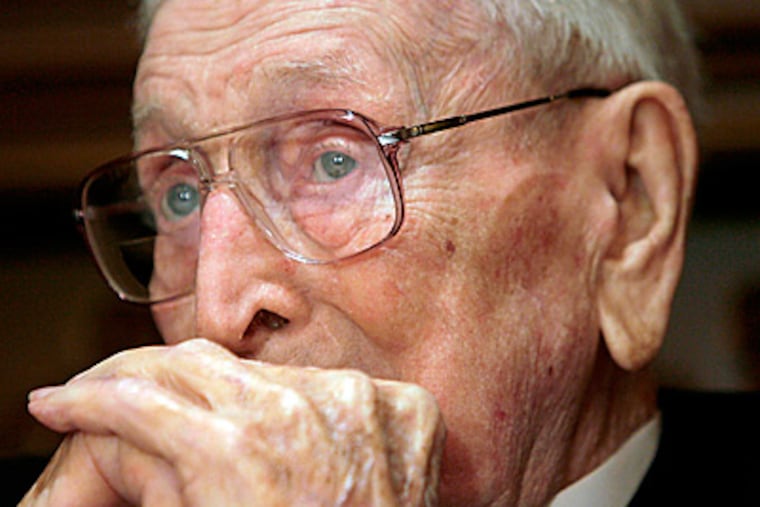Basketball legend John Wooden, 99
LOS ANGELES - John Wooden, 99, the UCLA basketball coach who became an icon of American sports while guiding the Bruins to an unprecedented 10 national championships in the 1960s and '70s, died Friday night.

LOS ANGELES - John Wooden, 99, the UCLA basketball coach who became an icon of American sports while guiding the Bruins to an unprecedented 10 national championships in the 1960s and '70s, died Friday night.
Mr. Wooden died of natural causes at the Ronald Reagan UCLA Medical Center, the university announced. He had been hospitalized since Wednesday for dehydration.
Although his fame extended beyond the sports world, Mr. Wooden's achievements during 27 seasons at UCLA put him in the company of such legendary coaches as the Green Bay Packers' Vince Lombardi and Notre Dame's Knute Rockne.
His string of championships began with back-to-back victories in 1964 and '65. Starting in 1967, his team ran off seven consecutive NCAA titles - going 38 tournament games without a loss - a feat unmatched before or since in men's college basketball.
The Bruins won with such dominant big players as Kareem Abdul-Jabbar and Bill Walton. They also won with teams - such as Mr. Wooden's last squad in 1974-75 - that had no marquee stars.
That team defeated Kentucky, 92-85, in the national championship game to give Mr. Wooden his 10th and final title.
"It's kind of hard to talk about Coach Wooden simply, because he was a complex man," Abdul-Jabbar said in a statement released through UCLA. "But he taught in a very simple way. He just used sports as a means to teach us how to apply ourselves to any situation.
"He set quite an example. He was more like a parent than a coach."
In 40 years of coaching high school and college, Mr. Wooden had only one losing season - his first. He finished with 885 wins and 203 losses, and his UCLA teams still hold an NCAA record for winning 88 consecutive games from 1971 through 1974.
The man known as the "Wizard of Westwood" - a nickname he despised - built his dynasty on simple precepts. He insisted that his squad be meticulously prepared and in top physical condition. He demanded crisp fundamentals and teamwork. He wanted his players to be smart, both on the court and away from the game.
To that end, the stern, dignified Midwesterner developed his "Pyramid of Success" - a teaching system based on such traditional values as cooperation and personal responsibility. Years later, advocates of the program used it as a motivational tool in the corporate world.
In 1932, Mr. Wooden, a three-time All-America, led Purdue to its only national basketball championship and married his high school sweetheart, Nell Riley. After graduation, he went to work as a coach and English teacher at Dayton (Ky.) High School, where his first team went 6-11, and then at South Bend (Ind.) Central High, where he nurtured a string of winning teams.
During World War II, he enlisted in the Navy to serve as a physical trainer for combat pilots. Upon his discharge in 1946, he took a job as athletic director and coach of the basketball and baseball teams at what is now Indiana State University.
After two winning seasons there, it was on to UCLA in 1948. Mr. Wooden had highs and lows at first, his team advancing to the NCAA tournament a few times but then falling to 14-12 in 1960.
The UCLA team of 1963-64 had no one taller than 6-foot-5 in the starting lineup but compensated for the lack of size with veteran leadership and great quickness.
The so-called Bruin Blitz - a zone press - smothered opponents and allowed guards Walt Hazzard and Gail Goodrich to score in bunches. The Bruins stormed into the NCAA tournament undefeated and in the championship game pulled away for a 98-83 victory over Duke.
The winning continued into the next season. In the NCAA title game, UCLA scored a 91-80 victory over Michigan.
Those first two championships had been won with strategy and fundamentals. After a mediocre season in 1965-66, Mr. Wooden and his Bruins resumed their streak with star power.
The winter of 1966 brought Lewis Alcindor - who later changed his name to Abdul-Jabbar. Alcindor, at 7 feet plus, dominated the game over the next three seasons, with the team playing in brand-new Pauley Pavilion. He led the Bruins to an 88-2 record and three straight titles.
After Alcindor moved on to the NBA, the Bruins pushed their championship streak to five with titles in 1969-70 and 1970-71.
From the moment that center Walton stepped on the court at the start of the 1971-72 season, the Bruins seemed untouchable. The "Walton Gang" stormed through consecutive 30-0 seasons, winning their sixth and seventh straight titles.
During this era, the Bruins won 88 consecutive games, a streak that ended with a loss at Notre Dame on Jan. 19, 1974. UCLA's championship run finally ended that season with a double-overtime loss to North Carolina State in an NCAA semifinal.
On Mr. Wooden's final night as a coach - March 31, 1975 - in the NCAA final, the Bruins outran and outhustled a stronger Kentucky squad, winning, 92-85.
In 1977, the Los Angeles Athletic Club established the Wooden Award, recognizing the best college player of the year - a basketball version of football's Heisman Trophy.
He is survived by his son, Jim; daughter, Nan; seven grandchildren; and 13 great-grandchildren. One of his great-grandchildren, Tyler Trapani, is a non-scholarship player on the UCLA basketball team.